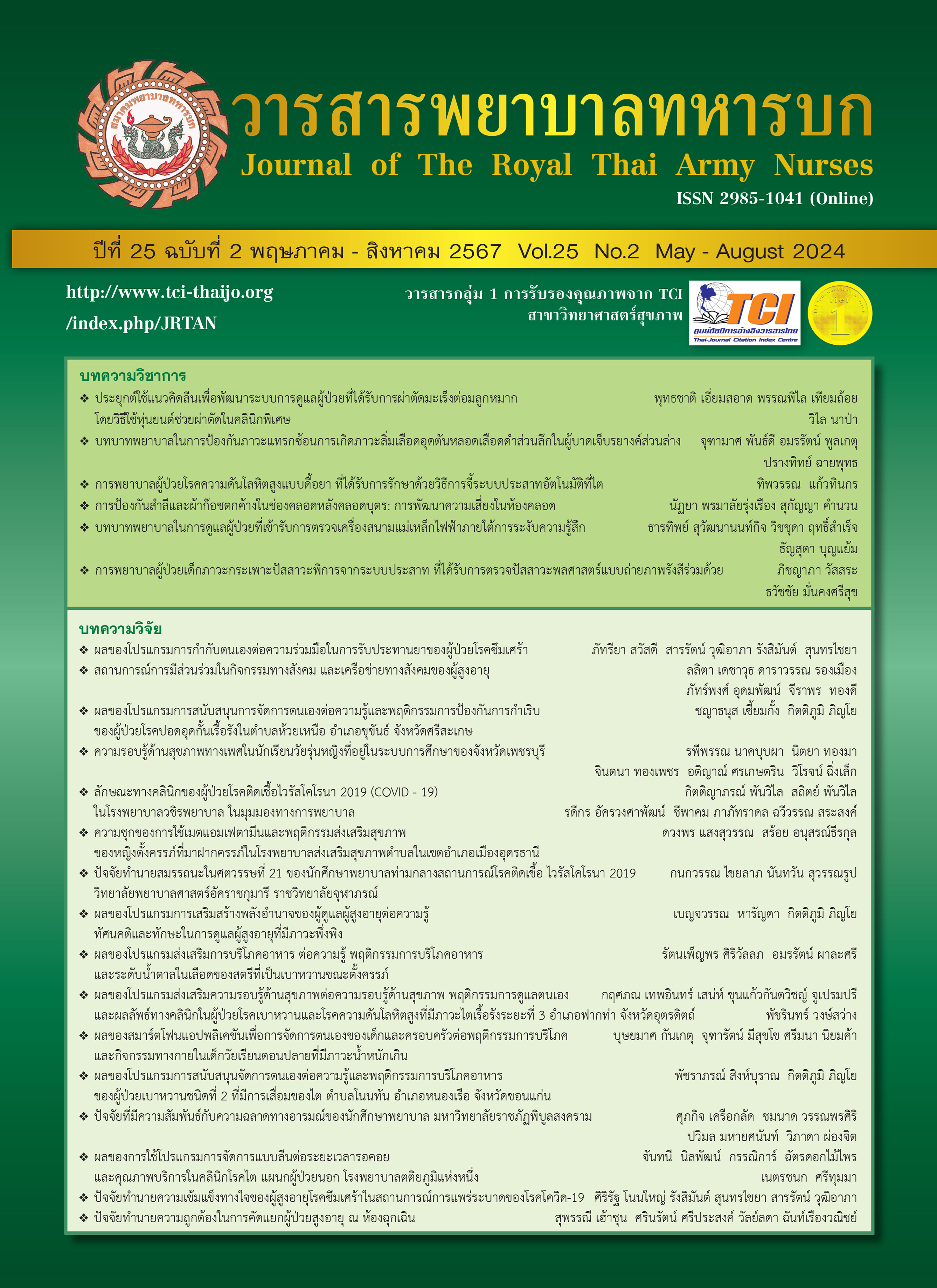Factors Related to Emotional Intelligence of Nursing Students Pibulsongkram Rajabhat University
Keywords:
Nursing students, Emotional intelligence, StressAbstract
Nursing students need to be emotionally intelligent because they are under stress while learning theory and practice and, after graduation, will be part of a healthcare team caring for patients, they must be emotionally intelligent and prepared to handle stress and challenges wisely. This research was survey research to study factors related to emotional intelligence of nursing students Pibulsongkram Rajabhat University. The sample included 145 nursing students in the 1st-4th years of the program at Pibulsongkram Rajabhat University. The sample was selected using probability sampling and stratified sampling. A three-part questionnaire that includes a general information section, the Suanprung Stress Scale (SPST-20), and the Department of Mental Health’s Emotional Quotient Scale serves as the study tool. The reliability tested by Cronbach’s alpha correlation coefficient were .90 and .95, respectively. The data were then analyzed for finding frequency, percentage, mean, standard deviation, and Pearson correlation statistics.
The findings revealed that 1) Emotional intelligence level of nursing students Pibulsongkram Rajabhat University was average (x̅ = 162.04, S.D. = 18.80), and 2) Stress was moderately negatively correlated with emotional intelligence of nursing students at Pibulsongkram Rajabhat University, with statistical significance at the .05 level (r = -.404, p<.05).
Downloads
References
Panich. V. Creating learning for the 21st century. 2nd ed. Bangkok: Chulalongkorn; 2014. (in Thai)
Ministry of Education. The National education plan, B.E. 2017-2036. Bangkok: Office of the Education Council; 2017. (in Thai)
Rattanaraj P. Desirable Characteristics Among Graduate Nurses of Ubon Ratchathani Rajabhat University. Ubon Ratchathani Journal of Research and Evaluation. 2020; 9(1): 20-30. (in Thai)
Nussutam, W., Riangsanor, A, & Jeeraya S. The Development of Emotional Intelligence in Nursing Students. Nursing Journal. 2017; 44(2): 111-18. (In Thai)
Nuchsutham W. Emotional quotient of nursing students, Faculty of Nursing, Chiang Rai College. Community Health Development Quarterly Khon Kaen University. 2016; 4(4): 505-19. (in Thai)
Goleman, D. Emotion Intelligence. New York: Bantan Book; 1998.
Thailand Nursing and Midwifery Council. Nursing Council Announcement. Working hours policy for patient safety. Bangkok; 2017. (in Thai)
Nuchsutham W., Kaewkunta P., Somboon L., Boonthai C., & Muangmakham S. Effect of Emotional Quotient Promoting Program on Emotional Quotient among Nursing Students. Nursing Journal. 2018; 45(1): 110-21. (in Thai)
Sirichockwattana K. Super E.Q. Happiness & Success can be created by heart. 2nd ed. Bangkok: Rungsamg; 2018. (in Thai)
Department of mental health, Emotional Quotient. Nonthaburi: Bangkok; 2003. (in Thai)
Bormann VS. Emotional Intelligence and Readiness in Performing Professional Nursing Roles among Nursing Students. Journal of Health Science Research. 2010; 4(2): 47-57.
Ngamkham N., Chitraboon K., ChaichanaN., Kanyanthong P., Yurak P., & Nuchsiri P. Factors affecting emotional quotient of students in health science curriculums at Huachiew Chalermprakiet University. Huachiew Chalermprakiet University Journal of Health Science. 2016; 20(39): 45-56. (in Thai)
Thongeiad, K., & Chaiprom, D. Emotional Intelligence and Stress among Nursing Students of Faculty of Nursing of Suratthani Rajabhat University. Suratthani Rajabhat Journal. 2018; 5(2): 214-32. (in Thai)
Panjiang P. Factors Affecting Emotional Quotient and a model of Emotional Quotient Development of Students in Higher Education Institutions in Songkhla Province. 2015.
Leksungnoen S. Emotional intelligence of first year students Silpakorn University Sanam Chandra Palace. (thesis). Nakhon Pathom: Silpakorn University, Sanam Chandra Palace Campus; 2018. (in Thai)
Pongklum O., Klommake J., Pakluck P., Khuttamasoon T., Bunluesup W., & Hongthong M. The Emotional Quotient among Nursing Students in a Private University, Bangkok. The Journal of Faculty of Nursing Burapha University. 2017; 25(3): 9-19. (in Thai)
Thato R. Nursing research: concepts to application. 3rded. Bangkok: Chulalongkorn; 2018. (in Thai)
Ukkakimapan J., Tepvorachai U., Sompittayanurak N., & Tareepean N. The Emotional Quotientof Nursing Students Pathum Thani University. Journal of Nakhonratchasima College (Humanities and Social Sciences). 2021; 15(3): 122-33. (in Thai)
Sritawan K., Chinkhaokham D., & Kitnopkiat K. Factors Related to Emotional Intelligence among Nursing Students of Boromarajonani College of Nursing, Ratchaburi. Journal of The Royal Thai Army Nurses. 2023; 24(1): 109-15. (in Thai)
Jahan K. Emotional intelligence related to stress: a study on college students. The International Journal of Indian Psychology. 2020; 8(1): 495-500.
Stevens C., Schneider E., Miller BP., & Arcangelo K. Exploring The Relationship Between Emotional Intelligence And Academic Stress Among Students At A Small, Private College. Contemporary Issues in Education Research. 2019; 12(4): 93-102.
Downloads
Published
How to Cite
Issue
Section
License
Copyright (c) 2024 Journal of The Royal Thai Army Nurses

This work is licensed under a Creative Commons Attribution-NonCommercial-NoDerivatives 4.0 International License.
บทความหรือข้อคิดเห็นใดใดที่ปรากฏในวารสารพยาบาลทหารบกเป็นวรรณกรรมของผู้เขียน ซึ่งบรรณาธิการหรือสมาคมพยาบาลทหารบก ไม่จำเป็นต้องเห็นด้วย
บทความที่ได้รับการตีพิมพ์เป็นลิขสิทธิ์ของวารสารพยาบาลทหารบก
The ideas and opinions expressed in the Journal of The Royal Thai Army Nurses are those of the authors and not necessarily those
of the editor or Royal Thai Army Nurses Association.






